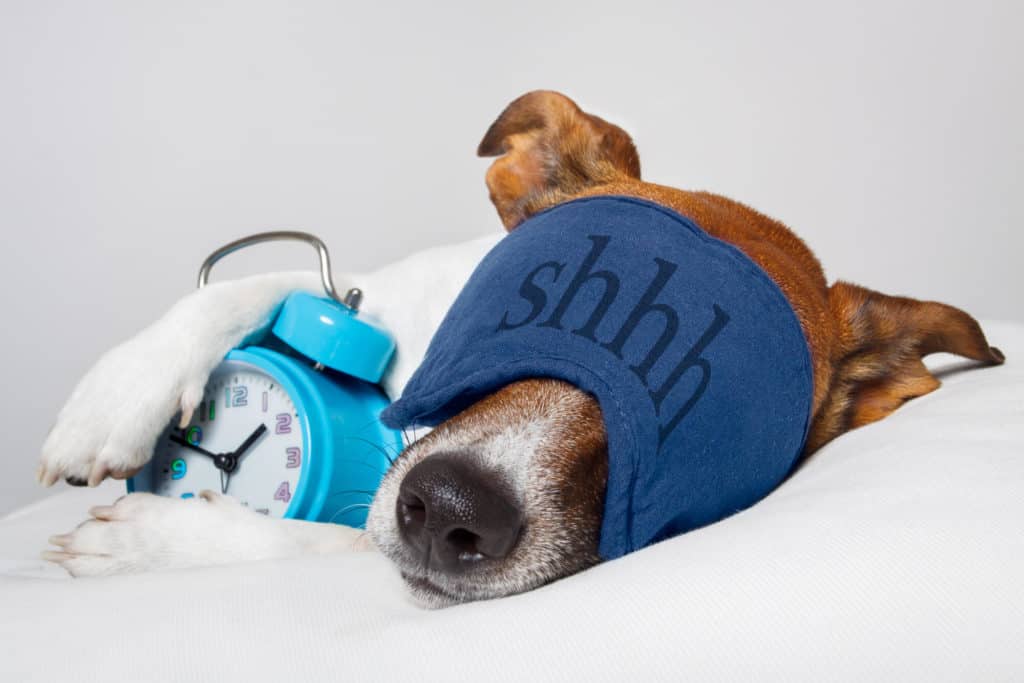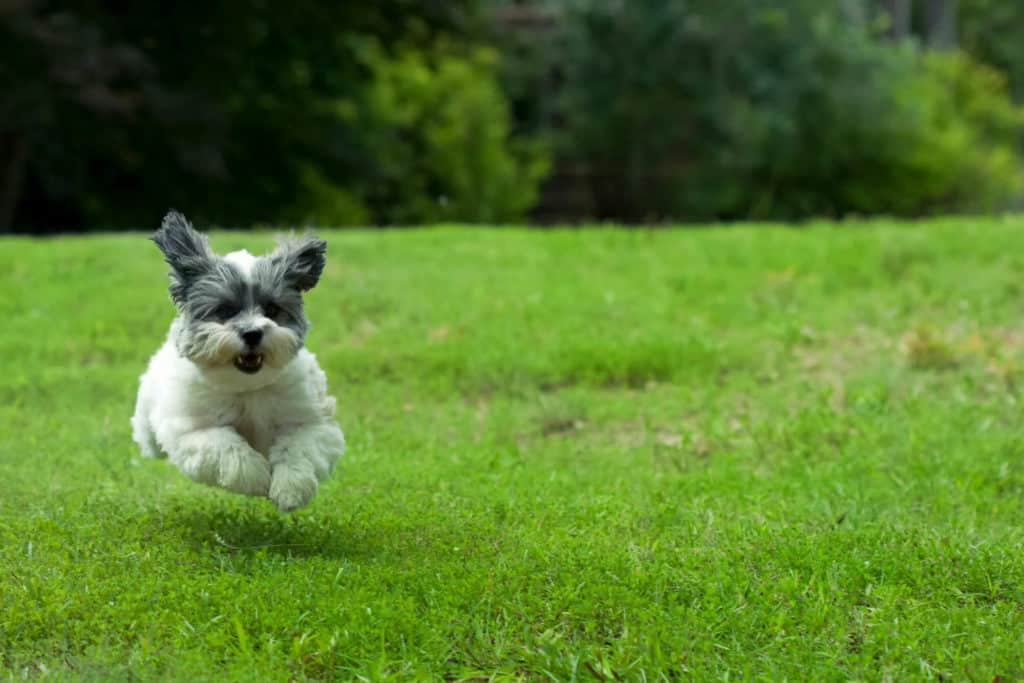Most 9 to 10-week-old puppies can’t sleep through the night without at least a couple of interruptions. Reasons for this include potty breaks, feeling lonely or being bored.
A lot of new dog owners get their puppies when they’re around 9 to 10 weeks old. At such a young age, it’s normal to worry about the various behaviors of your little pet, especially when it comes to sleep.
Similar to human babies, puppies need plenty of sleep. But can a 9 to10 week old puppy sleep through the night?

Should a 9 to 10-Week-Old Puppy Sleep All Night?
Before we get into whether or not a puppy can stay asleep through the night, you should first understand if that’s good for the puppy.
Sleep is essential for puppies. Just like human newborns, puppies need a lot of sleep to allow for healthy development and growth of their bones, muscles, nervous system, and immunity.
Sleep gives their tiny bodies a chance to invest all of their energy into boosting and building their strength, skills, and functions.
Staying up means spending more energy playing and engaging in various activities. Being super active, puppies tend to burn significant amounts of energy every waking hour.
As such, they need more time to recover and recharge.
If you could get your puppy to sleep through the night without interruptions, then you should. It’s good for their health and saves you from waking up to tend to their needs.
How Much Sleep Do Puppies Need?
Puppies sleep a total of 18 to 20 hours per day, according to the AKC (According to the American Kennel Club).
These hours are divided into long nighttime sleep and short daytime naps.
Helpful Dog Training Resource:
For help with training your dog, you should take a look at The Online Dog Trainer by Doggy Dan. Doggy Dan is an expert Dog Trainer based in New Zealand. His online resource contains Hundreds of Excellent Dog Training Videos that will take you step-by-step through the process of developing a healthy, happy well-behaved dog.
How Much Sleep Does a 9-Week-Old Puppy Need?
A 9-week-old puppy doesn’t do anything other than play, eat, drink, go to the bathroom, and sleep.
These activities may not seem like much to you, but they take quite a toll on his small body.
To make up for burnt energy and support proper development, a 9-week-old puppy needs to sleep at least 18 hours a day.
4 or 5 of these will take place during the daytime as naps of around 30 minutes up to 2 hours. The remaining hours will be at night, probably interrupted with 3 or 4 potty breaks.
How Much Sleep Does a 10-Week-Old Puppy Need?
The difference between a 9-week and a 10-week-old puppy is hardly significant.
10-week-old puppies also require a minimum of 18 hours of sleep. However, they may sleep less during the day and shift the extra hours to nighttime sleep.
Is It Possible For a 9 to 10-Week-Old Puppy Sleep All Night?
It’s as likely for a 9 or 10-week-old puppy to sleep through the night as it’s likely for a human baby to do so.
That’s right, the chances are slim to none.
What Keeps a 9 to 10-Week-Old Puppy From Sleeping All Night
Various reasons can prevent a puppy from sleeping through the night, and your furry baby will probably experience one or a bunch of them.
- Small bladder — a tiny body corresponds to a tiny bladder. With a relatively small bladder, a puppy is physically unable to hold its pee for longer than 3 or 4 hours.
So when nature calls, both you and your puppy have to wake up to answer. Sleeping through the night means no potty breaks, this could be a sign of dehydration or could lead to bladder problems.
- Loneliness — a young puppy is very prone to feeling lonely as he misses his mother. At 9 or 10 weeks old, you probably just got him home.
Imagine being separated from your mother after spending literally your whole life with her. The associated anxiety can make your puppy restless and interrupt his slumber.

- Boredom — puppies are little balls of energy. They're usually very active, playful, and always on the move.
If your puppy doesn't get enough physical stimulation to burn through his energy before bedtime, he probably won't be able to sleep through the night due to boredom and pent-up energy.
- Unfamiliar environment — your puppy is a baby who's still adjusting to his new life. He doesn't know your house well enough and needs time to get familiar with his surroundings.
This could also cause your puppy some anxiety, effectively preventing uninterrupted sleep.
- New schedule — if you're trying to implement a sleeping schedule, your 9 or 10-week-old puppy is too young to understand that.
You need to be patient and expect that it won't work right away. Additionally, if you set a schedule, stick to it.
Puppies can't keep up with a new schedule every few days and will likely be unable to sleep through the night.
Helpful Dog Health Resource:
Note: Our Health is #1 Priority. It should be no different for your dog. But you need to help him. The Ultimate Guide to Dog Health is the answer. This handy guide will help you recognize the symptoms of the health problems above. Get the knowledge to stay ahead of these terrible issues that can rob your lovely dog from vigor and life. Help your friend make it to 14 yrs+ without pain and suffering.
How to Help Your 9 to 10-Week-Old Puppy Sleep With Fewer Interruptions
Here are a few tips to help you reduce interruptions during your puppy’s nighttime sleep:
1. Provide a Comfortable Crate
A crate doesn't have to be expensive to be inviting and comfortable. All you need is a couple of soft blankets and a soft chewing toy.
You can also bring the crate into your room to ease your puppy's anxiety.
2. Make Sure It’s Dark and Quiet
If there's a loud noise or a bright light around your puppy, chances are he'll wake up.
To ensure a better night's sleep, the puppy's environment should be quiet and dark. You can incorporate a dim night light and/or soothing sound to coax your puppy into staying asleep.
3. Minimize Food and Liquid Intake Before Bedtime
Don't give your puppy food or water at least 2 hours before bedtime.
This way, he'll have the time to digest his intake and eliminate it before sleeping. Also, his urges won't be as frequent as he sleeps.
4. Allow For Plenty of Exercises

If your puppy is exhausted, it's more likely he'll sleep more without interruptions. So, you need to have him spend most of his energy by bedtime.
Engage in playtime, provide entertaining toys, and take your puppy for a short walk towards the end of the day.

Paul has been creating content for the dog niche for many years. The information he shares comes his first hand experience growing up in dog lovers household and then owning multiple dog breeds of his own as an adult. Paul enjoys doing the hard research to collect, analyze and present our dogtemperament.com readers with the best answers to their questions.